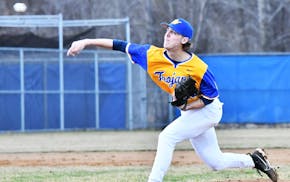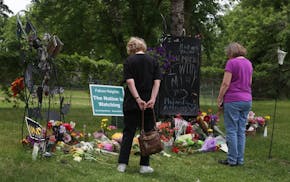A Supreme Court reprimand and probation may not be enough of a penalty for a Hennepin County prosecutor who practiced law for 20 years while her license was on hold.
Hennepin County Public Defender Lenny Castro and other court observers say the handling of Gemma Graham's case by Hennepin County Attorney Mike Freeman's office raises serious questions.
Castro said his office is examining the cases tried by Graham between 1986 and June 2007 to see if any action can be taken.
"We really do need to consider what the legal ramifications are to all the people she prosecuted or filed a complaint against," he said. He was unable to say how many cases that might be.
Freeman declined repeated interview requests last week.
"I would expect the county attorney to hold itself to the same standards it holds the public," Castro said.
The Minnesota Supreme Court recently publicly reprimanded Graham and placed her on two years' probation.
The court determined that she "engaged in the unauthorized practice of law" for more than 20 years while on restricted status for failing to submit affidavits of continuing legal education as required.
"The bottom line is she's practicing law without a license," which is a misdemeanor, said David Schultz, who teaches ethics to law students at the University of Minnesota.
Prosecute a prosecutor?
"I'm bothered by two things: I thought it was a fairly lenient sentence," Schultz said. "The second thing is somebody ought to prosecute this."
Schultz and Castro, among others, say Freeman should have sent the case to another county attorney to review for possible criminal charges. As Graham's employer, Freeman's office has a conflict of interest, Schultz said.
When Graham's troubles first surfaced last May, Deputy County Attorney Pat Diamond called them a "technical defect." Every year lawyers must submit an online affidavit showing they have completed 45 hours of continuing legal education credits.
"Classes are designed to make sure lawyers have continuing knowledge of the law," said Margaret Corneille, director of the Board of Continuing Legal Education (CLE). Courses focus on changes in the law and new cases. Corneille said she couldn't discuss Graham's credits, but said that attorneys are sent notices of noncompliance when they need credits and that they can ask for extensions.
Schultz also has served on the board. The idea of the classes is "we don't want lawyers getting stale, we want them constantly learning," he said. "Prosecutors take an oath; they should be following the law."
Graham was hired by the county attorney's office in 1982. She works three-quarter time and earns $79,866 annually.
She has prosecuted the most serious crimes, including rapes and murders. Freeman's office declined to provide information about her caseload.
Her troubles date back to 1986. In the petition for disciplinary action to the state Supreme Court, the director of the Office of Lawyers Professional Responsibility said Graham was on restricted status beginning November 1986 for failure to comply with the rules regarding CLE credits.
Attorneys on restricted status may not practice law, the petition said. But Graham practiced law during that period through June 2007 in violation of the professional code of conduct.
In May, she was placed on a 21-day suspension from her work in Freeman's office. In June 2007, she submitted evidence to the CLE board that she had taken sufficient course work to be removed from restricted status. The board only required proof for the past two years, and she was reinstated on June 27.
Graham claimed to have completed more courses than required during some periods and fewer in other periods "due to health concerns," the petition said. Given the passage of time, the director said he couldn't confirm her claims. Graham has not returned calls to her office.
The new statewide courts computer system now flags lawyers who aren't up to date on legal credits. Until now, it was up to lawyers or their bosses to monitor credits. Castro said his office routinely checks on staff accreditation.
According to the law, it is a misdemeanor for anyone to engage in the unauthorized practice of law. State law also says "it shall be the duty of the respective county attorneys in this state to prosecute violations."
David M. Anderson, of Mahoney Anderson in Wayzata, said that if a lawyer in private practice committed such an act, he would be subject to triple damages. Anderson practices business law. He notes that if he's even late with a payment for his license, his license will be suspended.
"Unauthorized practice of law is a crime," he said. "When a public servant accepts paychecks ... under the pretense of being a licensed attorney, serious and substantial consequences should follow."
Rochelle Olson • 612-673-1747

Prep Athletes of the Week: Slender pitcher heavy on importance
Jogger on rural southwestern Minnesota road is hit from behind by pickup and killed

DFL Sen. Nicole Mitchell returns to Capitol after burglary charge, casts votes amid criticism

Lakeville teachers vote to authorize strike

